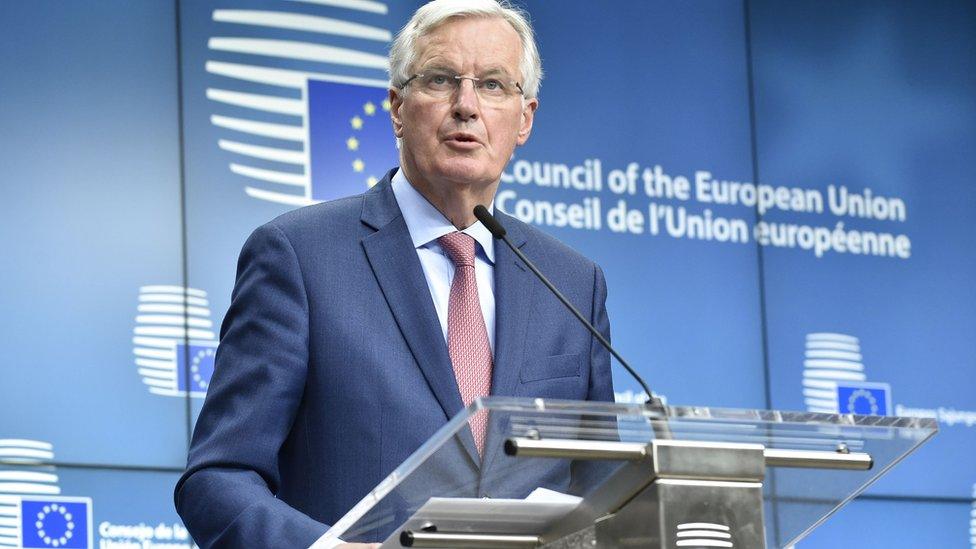EU agrees Brexit 'transition' negotiation guidelines
- Published
- comments

Chief negotiator Michel Barnier set out the EU's negotiating stance for the transition period
The European Union has set out its demands for the temporary transition period after the UK leaves in March 2019.
The EU wants the UK to continue to follow its rules but not be involved in making decisions.
Brexit Secretary David Davis said the UK wanted a "right to object" to new laws passed by the EU during this time.
Downing Street said there would "naturally" be differences between the sides ahead of negotiations.
The UK hopes the two sides can reach agreement by March.
The transition period - also referred to as an implementation period - is seen as a way to minimise disruption when the UK leaves the EU for things like business, holidaymakers and security.
It will also allow more time to finalise the terms of the UK's post-Brexit relations with the EU.
In their guidelines, the EU say:
Transition should run from Brexit in March 2019 to 31 December 2020
All EU rules and regulations - as well as EU rule changes adopted after March 2019 - should apply in the UK during the transition phase
There can be no "cherry picking" on the single market - so free movement into the UK should continue
The UK will not be involved in the decision-making of EU bodies
It cannot implement its own international agreements unless the EU agrees
Work should continue on finding a solution to the Northern Ireland border question, one of the main sticking points in the first round of negotiations
Speaking at a press conference after EU ministers agreed the negotiating guidelines, chief negotiator Michel Barnier said the UK would be allowed to attend decision-making meetings on a "limited, exceptional, case by case basis."
It would be able to negotiate trade deals with other countries but the deals could not come into force until the transition period was over, he added.
This is in line with the UK's negotiating stance, as set out by Mr Davis in a speech on Friday.
Mr Davis also said existing international agreements - which include trade deals with other countries and agreements on aviation and nuclear power - should continue to apply during the period.
Giving evidence to a House of Lords committee on Monday, Mr Davis said the UK wanted a "right to object" to new laws passed by the EU during the transition phase over which it had no say and disagreed with.
"It's not particularly democratic practice to just have the country accept without any say-so, anything - particularly if... the European Union takes it on itself to do something which is actively disadvantageous to a major British industry or something like that," he said.
"So that's why we've raised the matter, and let's see how it goes."
Asked what legal status this would have, he said he wanted such a safeguard included in the withdrawal agreement.

Analysis by the BBC's Adam Fleming in Brussels
It's the sort of amazing coincidence that the Brexit process throws up all the time.
Minutes after the Brexit Secretary David Davis laid out his concerns about the EU's transition proposals to a House of Lords Committee, Michel Barnier held a press conference where he knocked them down.
For example, David Davis wants a mechanism where the UK has a say on new European laws that might affect Britain while it's not in the club but still subject to the rules. The best Mr Barnier was prepared to offer was consultation "on an exceptional, case-by-case basis agreed by the 27 remaining member states".
And don't dare call it anything as grand as "observer status", he warned.
He dismissed the Brexit secretary's demands that Britain be allowed to negotiate trade deals with other countries during the transition period.
Of course they can, Mr Barnier said. In fact, Britain had better get a move on if it wants to replicate the 750 international agreements that come with EU membership.
True, this is the start of a negotiation but it is not clear that the EU sees anything to negotiate. Mr Barnier feels that he has already made the UK a generous offer that's in Britain's economic interest.
Plus, there was a reminder that the deal on the transition period is linked to a deal on everything else: no agreement on a final Brexit treaty means no transition.

Some in the UK are unhappy at the idea that the UK will have to follow the rules of the single market and the customs union, including freedom of movement for EU citizens, but will lose its voting rights.
Mrs May's Brexit ''inner circle'' of senior ministers met in sub-committee on Monday morning to discuss how the transitional phase could work, including the UK's demand that it be free to negotiate trade deals with other countries during the period.
Earlier a Downing Street spokesman said: ''There is obviously going to be a negotiation on what the implementation period looks like.
''The formal directives will be released this afternoon. This will be a negotiation and there will naturally be some distance in the detail of our starting positions."